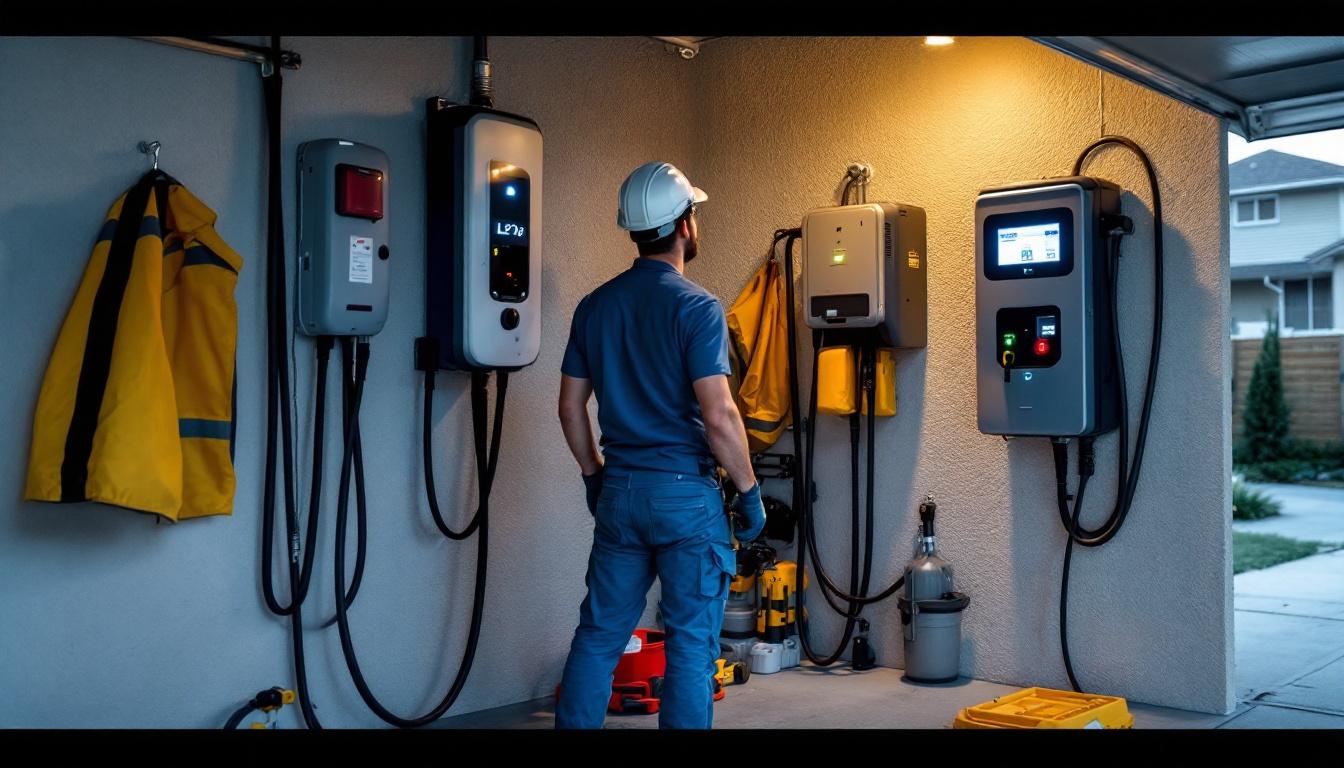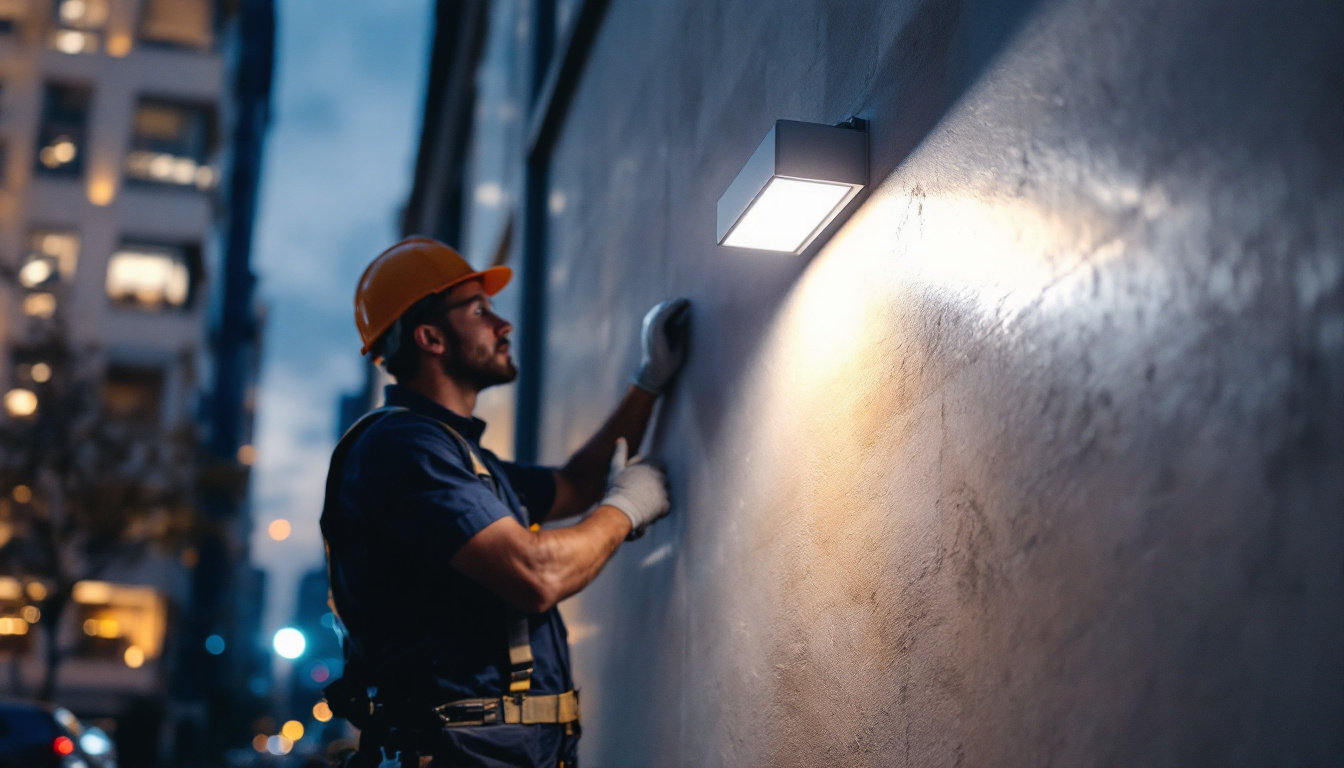
Electric vehicles (EVs) are becoming an increasingly common sight on roads worldwide, driven by environmental concerns, government incentives, and advancements in battery technology. This surge in EV adoption has created a parallel demand for reliable and efficient charging infrastructure. Among the various charging options, Level 2 (L2) EV chargers stand out as the preferred choice for residential, commercial, and public installations due to their balance of charging speed and accessibility.
For lighting contractors, this trend presents a significant opportunity to expand service offerings and deepen client relationships. However, installing L2 EV chargers requires specialized knowledge beyond traditional lighting systems. Understanding the technical, regulatory, and logistical aspects is essential to ensure safe, code-compliant, and efficient installations. As municipalities and businesses aim to meet sustainability goals, the push for more extensive EV charging networks is only expected to grow, creating a robust market for skilled professionals in this field.
Lighting contractors possess a strong foundation in electrical systems, wiring, and safety standards, making them natural candidates to take on EV charger installations. Their familiarity with electrical codes, conduit routing, and load calculations can be leveraged to seamlessly integrate EV charging solutions into existing or new electrical infrastructures. Additionally, the transition to EV chargers can often involve retrofitting existing structures, a process that lighting contractors are well-versed in, allowing for minimal disruption to the client’s operations.
Moreover, many lighting projects already involve upgrades to electrical panels and circuits, which align well with the requirements for L2 charger installations. This synergy allows contractors to provide comprehensive electrical services, enhancing project value and client satisfaction. The increasing integration of smart technology into EV charging systems also presents an exciting avenue for contractors. By incorporating smart chargers that can communicate with home energy management systems, contractors can offer clients innovative solutions that optimize energy use and reduce costs. As the technology continues to evolve, staying informed about the latest advancements will be crucial for contractors looking to maintain a competitive edge in the rapidly changing landscape of EV infrastructure.
Installing an L2 EV charger involves more than simply mounting a unit on a wall and plugging it in. Lighting contractors must carefully assess several technical factors to ensure optimal performance and compliance.
L2 chargers typically operate at 240 volts and can draw between 16 to 40 amps, depending on the model and settings. Before installation, contractors should evaluate the existing electrical panel’s capacity to handle the additional load without compromising safety or performance.
This involves calculating the total load on the panel, considering all connected devices and circuits, and determining whether there is sufficient capacity or if an upgrade is necessary. In some cases, installing a subpanel dedicated to EV charging may be the most efficient solution. Furthermore, understanding the local utility’s demand charges and peak usage times can help in planning the installation to minimize operational costs for the end user.
Proper wiring is critical for safety and functionality. The National Electrical Code (NEC) mandates specific guidelines for EV charger circuits, including wire gauge, conduit type, and circuit breaker sizing. For example, a 40-amp charger circuit typically requires 8-gauge copper wire and a 50-amp breaker to comply with NEC 625.42.
Lighting contractors must ensure that wiring is correctly sized, routed, and protected against physical damage. Ground fault circuit interrupters (GFCIs) or other protective devices may also be required, depending on the installation environment. Additionally, it is essential to consider the potential for voltage drop over long distances, which can affect charging efficiency. Proper planning for conduit runs and minimizing bends can help mitigate this issue.
Assessing the physical site is crucial for determining the optimal charger location. Factors such as proximity to the electrical panel, accessibility for vehicle parking, weather exposure, and user convenience all influence placement decisions.
For outdoor installations, weatherproof enclosures and corrosion-resistant materials are essential. Additionally, contractors should consider future expansion possibilities, such as adding more chargers or upgrading to higher-capacity units. It is also beneficial to evaluate the surrounding infrastructure, including lighting and signage, to enhance the user experience and ensure safety. Providing clear pathways and adequate space for maneuvering can significantly improve accessibility for all users, including those with disabilities.
Adhering to local codes and regulations is a non-negotiable aspect of L2 EV charger installations. Lighting contractors must navigate a complex landscape of standards, permits, and inspections.
The NEC provides the foundational framework for electrical safety, including specific articles addressing EV charging equipment. However, local jurisdictions may impose additional requirements or amendments. Staying current with these codes ensures installations meet legal standards and pass inspections without delays.
Contractors should maintain open communication with local building departments to clarify permitting processes and documentation requirements. This proactive approach reduces the risk of costly rework or project hold-ups. Furthermore, understanding the nuances of local codes can also offer contractors an opportunity to provide value-added services to their clients, such as advising on energy efficiency measures or potential rebates available for compliant installations.
Most jurisdictions require permits for EV charger installations, especially when modifications to electrical panels or wiring are involved. Obtaining permits typically involves submitting detailed plans and specifications, which should accurately reflect the intended installation.
After installation, inspections verify compliance with safety codes and manufacturer guidelines. Lighting contractors should coordinate inspections promptly and be prepared to address any identified issues efficiently. Additionally, understanding the inspection timeline can help contractors manage client expectations and project schedules. In some regions, expedited inspection services may be available, allowing for quicker project completion, which can be a significant selling point for contractors looking to differentiate themselves in a competitive market.
Successful L2 EV charger projects hinge on meticulous installation practices and clear communication with clients.
Before beginning work, contractors should conduct thorough site surveys and discuss client needs and expectations. Topics such as charging speed, usage patterns, and potential future expansions should be addressed.
Educating clients about the capabilities and limitations of L2 chargers fosters realistic expectations and satisfaction. Providing guidance on energy consumption, cost implications, and maintenance requirements adds value to the service. Additionally, discussing the environmental benefits of switching to electric vehicles can further motivate clients to invest in EV charging solutions, highlighting how their choices contribute to a greener future. By sharing insights on local incentives or rebates for EV charger installations, contractors can enhance the appeal of their offerings and help clients make informed financial decisions.
During installation, adherence to manufacturer instructions and code requirements is paramount. Using quality materials and tools ensures durability and safety. Proper labeling of circuits and clear documentation facilitate future maintenance and troubleshooting.
Post-installation testing, including verifying voltage levels, circuit protection operation, and charger functionality, confirms a successful setup. Contractors should provide clients with operational instructions and contact information for support. Moreover, offering a detailed walkthrough of the installed system can empower clients to utilize their chargers effectively, ensuring they understand how to maximize charging efficiency and troubleshoot minor issues independently. Including a FAQ sheet or a digital resource link can further enhance client confidence in managing their new equipment.
EV charging infrastructure benefits from periodic inspection and maintenance to ensure continued reliability. Lighting contractors can differentiate themselves by offering ongoing support packages, including system checks, firmware updates, and troubleshooting assistance.
This approach not only generates recurring revenue but also builds long-term client trust and loyalty. Furthermore, establishing a proactive communication strategy, such as regular check-ins or reminders for maintenance schedules, can keep clients engaged and informed about their systems. By fostering a relationship that emphasizes ongoing support, contractors can position themselves as trusted partners in their clients’ EV charging journey, ultimately leading to referrals and a stronger reputation in the market.
The EV charging landscape is rapidly evolving, presenting lighting contractors with opportunities to stay ahead of the curve.
Modern L2 chargers increasingly feature connectivity options, enabling integration with smart home platforms and energy management systems. Lighting contractors familiar with automation technologies can offer enhanced solutions that optimize charging schedules, reduce energy costs, and provide remote monitoring.
Such integrations align well with the growing demand for sustainable and intelligent building solutions.
While residential installations remain significant, commercial and public charging stations represent a burgeoning market. Lighting contractors can leverage their expertise to design and install multi-unit charging arrays, including considerations for load management, payment systems, and user interface design.
Partnering with property managers, municipalities, and businesses opens new revenue streams and strengthens community ties.
Government incentives, rebates, and grants often support EV charger installations, reducing costs for clients and encouraging adoption. Lighting contractors should stay informed about available programs to advise clients effectively and assist with application processes.
Knowledge of these financial opportunities can be a decisive factor for clients considering EV charging upgrades.
The rise of electric vehicles has transformed the electrical contracting landscape, with L2 EV charger installations emerging as a vital service area. Lighting contractors, equipped with electrical expertise and a commitment to quality, are well-positioned to capitalize on this trend.
By understanding technical requirements, adhering to regulatory standards, and embracing best practices in installation and client engagement, contractors can deliver safe, efficient, and user-friendly EV charging solutions. Staying abreast of emerging technologies and market opportunities will further enhance their competitive edge and contribute to a sustainable future.
Ready to take on the EV charging revolution? LumenWholesale is here to support lighting contractors like you with top-tier, spec-grade lighting and EV charging products at unbeatable wholesale prices. Say goodbye to local distributor markups and hello to a vast selection of industry-standard, high-performance products that will set your installations apart. Plus, with free shipping on bulk orders, you can stock up on everything you need while keeping your costs down. Don’t compromise on quality or value—choose LumenWholesale for the perfect blend of affordability and convenience. Start enhancing your EV charger installations today by visiting Wholesale Lighting at the Best Value.

Discover how integrating LED wall packs with photocells can revolutionize your lighting business.

Discover how track lighting LEDs can revolutionize your lighting projects and help you secure more contracts.

Discover the essential role of the three pole switch in modern lighting projects.

Discover how staircase step light bulbs can revolutionize your lighting projects by enhancing safety, aesthetics, and energy efficiency.